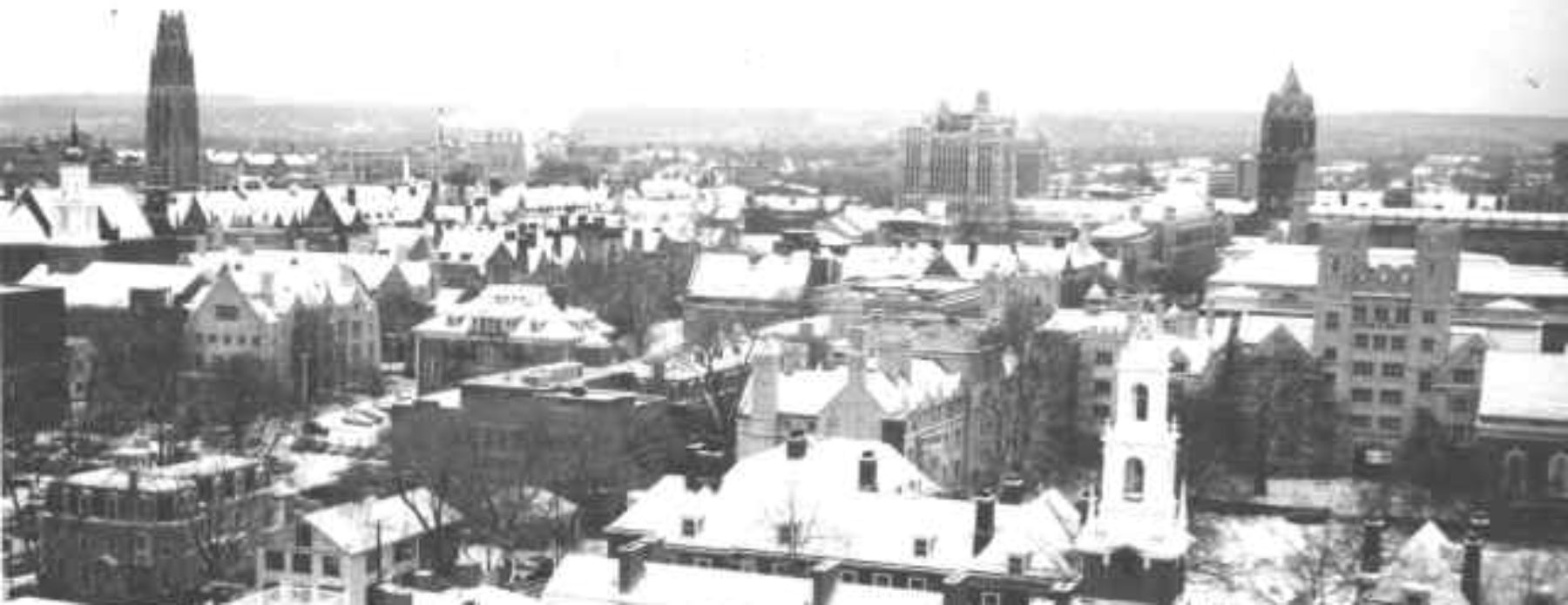 Fresh Faces: Fresh Faces:Found at Home Paul Clewell, Ezra Stiles ’98, Youngstown, OH |
Not too long ago I was roughly where you are today. I was a Yale freshman unpacking on campus, feeling a bit overwhelmed but eager to seize my new opportunities.
More than a year before, in April, a thick acceptance packet arrived, but since I was headed to Russia as an exchange student, I deferred Yale admission for a year. But before I saw Russia, I met the unexpected at home.
I spent that summer helping my father run our family business, a lakeside campground in northeastern Ohio. One duty I had was to clean the shower and restroom facilities at the center of the camp. I could not have known how much depended on doing a mundane chore.
As I was returning from cleaning showers late one evening, a camper our family had known for many years invited me to stop by and visit at their campfire. The woman’s name was Loretta. I noticed she and her sister Betty had Bibles in front of them. The two of them were, as Loretta put it, “studying the Word” together.
I wasn’t surprised. During the past several days I had seen Loretta several times, and each time she had made no secret of her religious beliefs. She was not pushy about it, but neither was she timid. One day she spoke openly about the Holy Spirit, as if speaking of a person she knew.
Another evening she and her Uncle Chuck, who was in his mid-eighties, told me about Jesus. I listened curiously as Chuck told how he had battled alcohol for decades, trying all manner of ways to beat it, and had failed. Then he turned to Jesus. Jesus, Chuck said, had done what nothing else could do for him. “Jesus set me free,” he said, from alcohol.
That night I looked intently at the old man’s eyes, the eyes of a former tugboat captain on the Ohio River, eyes turning milky with cataracts. He didn’t look directly at me, only down at the fire, poking it occasionally with a stick. Was he telling the truth? Two things were sure: he believed that Jesus was real and that Jesus had helped him. And he wasn’t getting drunk anymore.
Now, several nights later, there I was, talking with Loretta about religion again. When I rose to leave, Loretta invited me to join her and her sister in a brief time of prayer. I hesitated for a moment, feeling insincere, knowing that my commitment to their set of beliefs wasn’t deep like theirs, sensing that earlier I had signalled more interest than I felt.
Then I thought, “Why not?” After all, I faithfully prayed the Lord’s Prayer every night before drifting off to sleep. I occasionally read the Bible. Although our family didn’t attend church and wasn’t religious, we considered ourselves Christians.
Seeing no harm in a moment of prayer, I sat back down and joined hands with Loretta and Betty. When it was her turn to pray, Loretta expressed thanks to the Lord for giving us a time together. Then she began speaking in a language I couldn’t understand, a language with soft and gentle tones, and she sang. She alternated between English and the language I had never heard before. I could tell from the English words that it was a song of praise to God.
At the same moment I sensed the presence of God at the campfire. It was not a feeling or a physical sensation. It was a powerful internal knowledge, overriding all my other perceptions: knowledge that God was real, that He was a living Person, that He was here—now. And He knew me, all the way inside.
The sense so convinced me that I remember opening my eyes and lifting my head (our heads were still bowed) to glance at the place where I believed the Spirit of God was. I saw nothing out of the ordinary there, but the internal conviction remained. I looked back at Loretta, still singing softly, eyes closed. My thoughts expressed my new conviction: “It’s all true! What these women have been telling me about this Jesus is all true.” True with a capital “T.”
After prayer, Loretta explained that sometimes she prayed in a “heavenly language,” which the Holy Spirit enabled her to do. That was what I had heard.
That night I told Loretta and Betty nothing of what had happened. I thanked them for their hospitality and went home, where I prayed alone before going to bed. This time, however, I prayed on my knees, not from a dutiful piety but rather from a sense of reverence for the Holy God I now knew. Inside I also knew, now, that Someone was listening to me when I prayed.
I told the Lord I was sorry, sorry because I simply hadn’t known He was real.
Several weeks later I boarded a plane to Russia for a year of study. In Russia, and at Yale, and later in law school, I became ever more convinced of the truth of God in Jesus Christ that I first found that night nine years ago.
I know what it’s like to be a freshman at Yale. During the coming weeks, as you face ever-increasing demands on your time and attention, I urge you to take a moment to consider the state of your relationship with God. Loretta, Betty, and their Uncle Chuck told me about a Jesus who changed their lives forever, a Jesus I didn’t even know I needed to know. Now I too am convinced of His truth and power, and I pass the message on to you.
Paul Clewell, Ezra Stiles ’98
© 2002 The Yale Standard Committee

